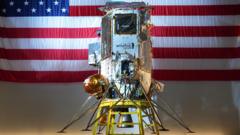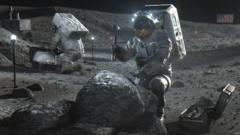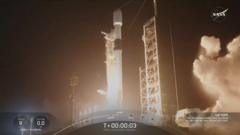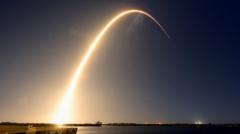**Blue Ghost's mission not only demonstrates technological advancements but also opens doors for future commercial activities on the Moon.**
**Commercial Spacecraft Blue Ghost Achieves Historic Moon Landing**

**Commercial Spacecraft Blue Ghost Achieves Historic Moon Landing**
**The private venture marks a significant milestone in lunar exploration with successful touchdown on the Moon's surface.**
A pioneering moment in the realm of commercial space travel has occurred as the Blue Ghost spacecraft successfully landed on the Moon, making it the second privately operated vehicle to achieve such a feat. Launched on January 15 by Firefly Aerospace, Blue Ghost embarked on a mission to examine the Sea of Crises, an expansive lunar crater observable from Earth.
The landing is part of an increasingly common collaboration between private industry and NASA, and it signals a new era of ambitious lunar explorations. Another company, Intuitive Machines, is poised to attempt a lunar landing with its Athena spacecraft near the Moon's south pole shortly. Last year, Intuitive’s Odysseus spacecraft became the first private entity to land on the lunar surface; however, its journey was cut short when it toppled over after landing on an uneven slope.
Celebrations erupted at Firefly's Texas headquarters upon confirmation of Blue Ghost's successful touchdown, following a two-week orbit around the Moon. Dr. Simeon Barber, a planetary science expert from the Open University, emphasized the significance of this landing, stating that Blue Ghost represents the first viable private effort on the Moon, remaining intact and functional post-landing.
"This mission has successfully revived technologies for lunar landings that have been largely forgotten since the Apollo missions," Dr. Barber remarked on a morning news show. Highlighting the strategic importance of the Moon, he noted that private enterprises view it as a staging ground for deeper space exploration.
According to Dr. Barber, advancements in private sector involvement are key to driving down costs associated with lunar exploration, often deemed unsustainable under previous government-led missions. He believes that future expeditions will likely return humanity to the lunar surface, driven by commercial competition that could lead to innovative and cost-effective resource utilization on the Moon.
Previous attempts by firms like Astrobotic Technology to reach the Moon faced setbacks, such as the failed January 2024 mission resulting in a crash due to a suspected fuel leak. This underscores the challenges inherent in lunar exploration ventures, yet also the evolving landscape as private companies enter the fray.
As space exploration continues to evolve, the successful landing of Blue Ghost paves the way for more ambitious private missions and signifies a shift in how humanity perceives its relationship with the Moon and beyond.



















